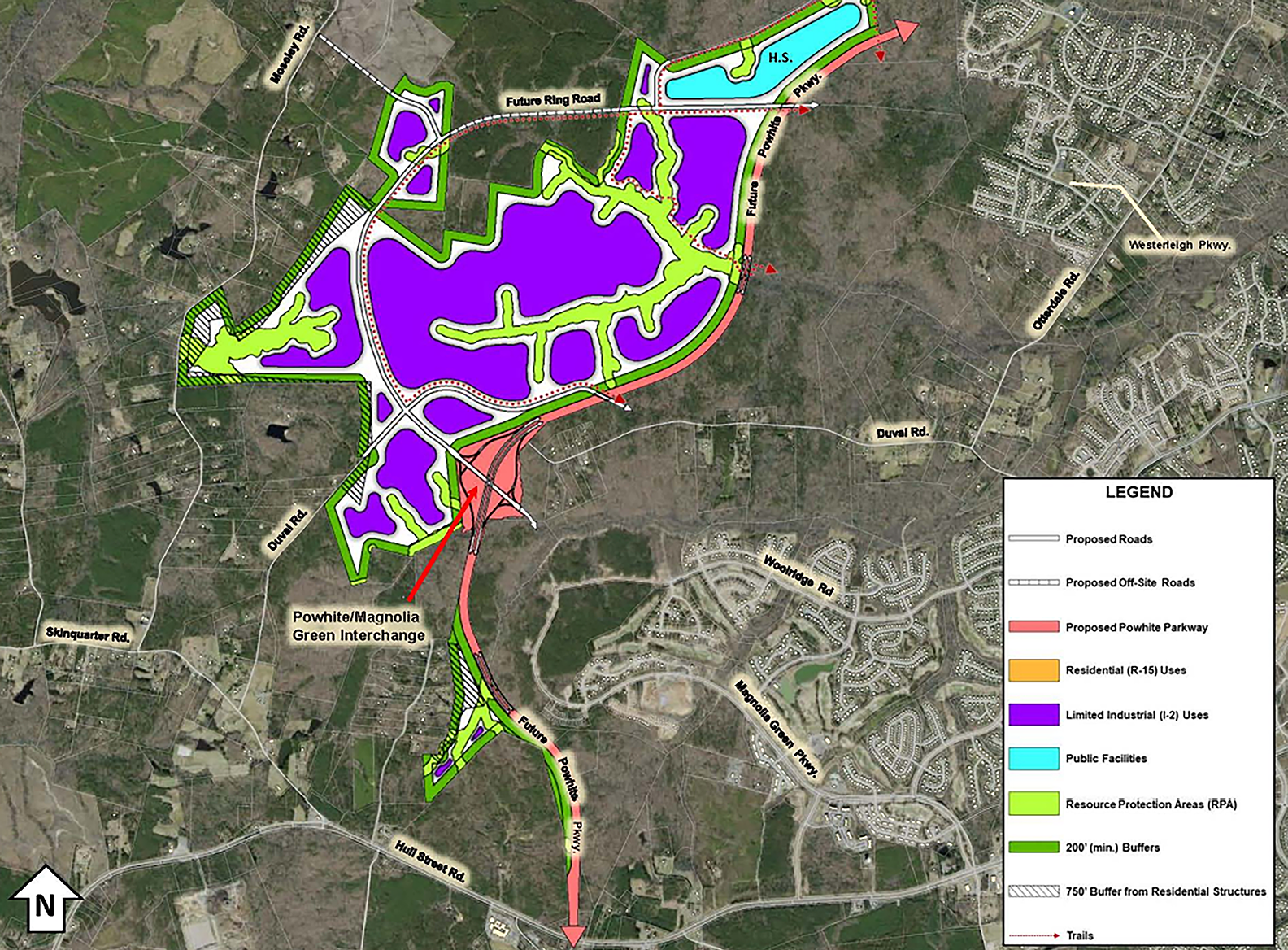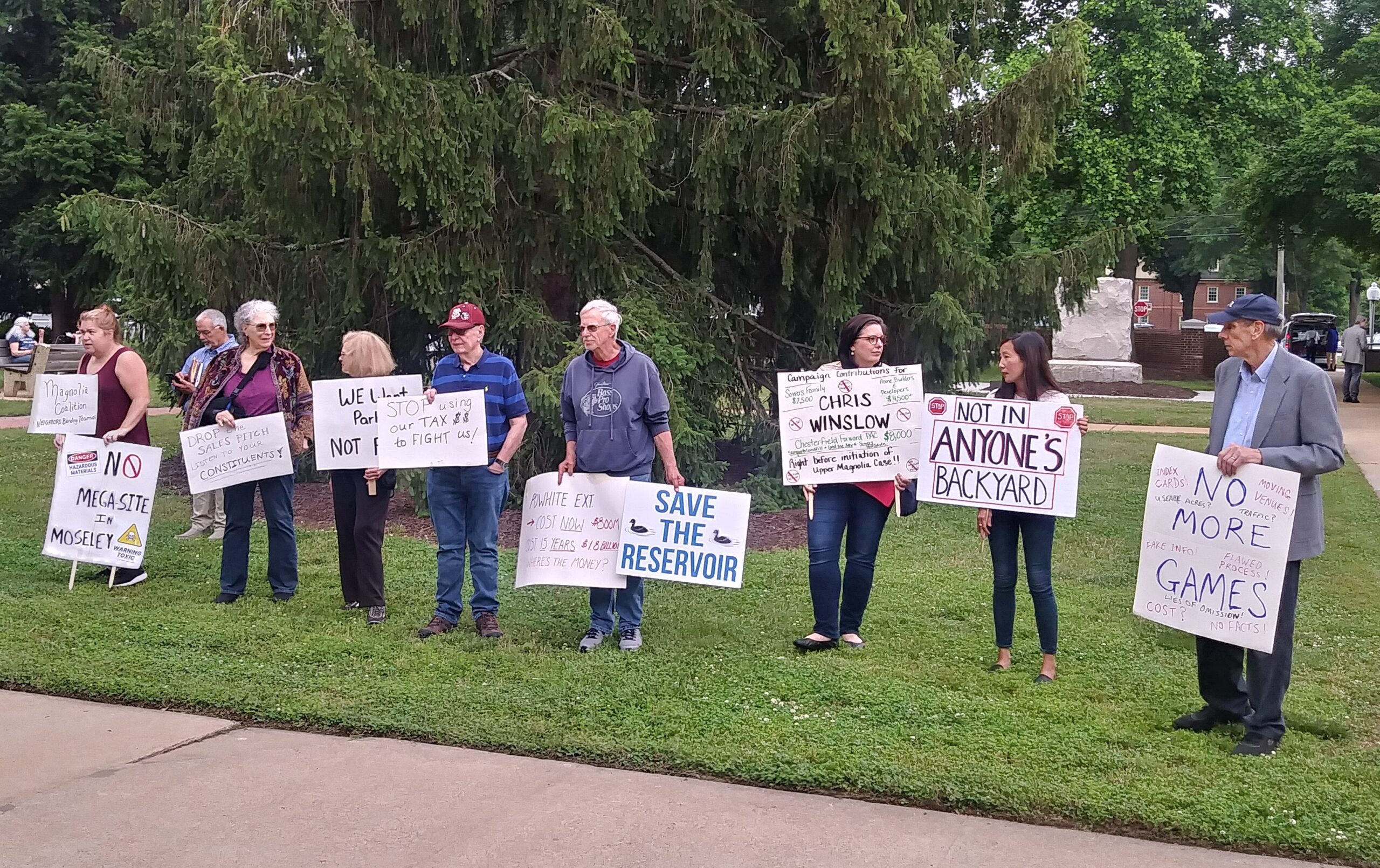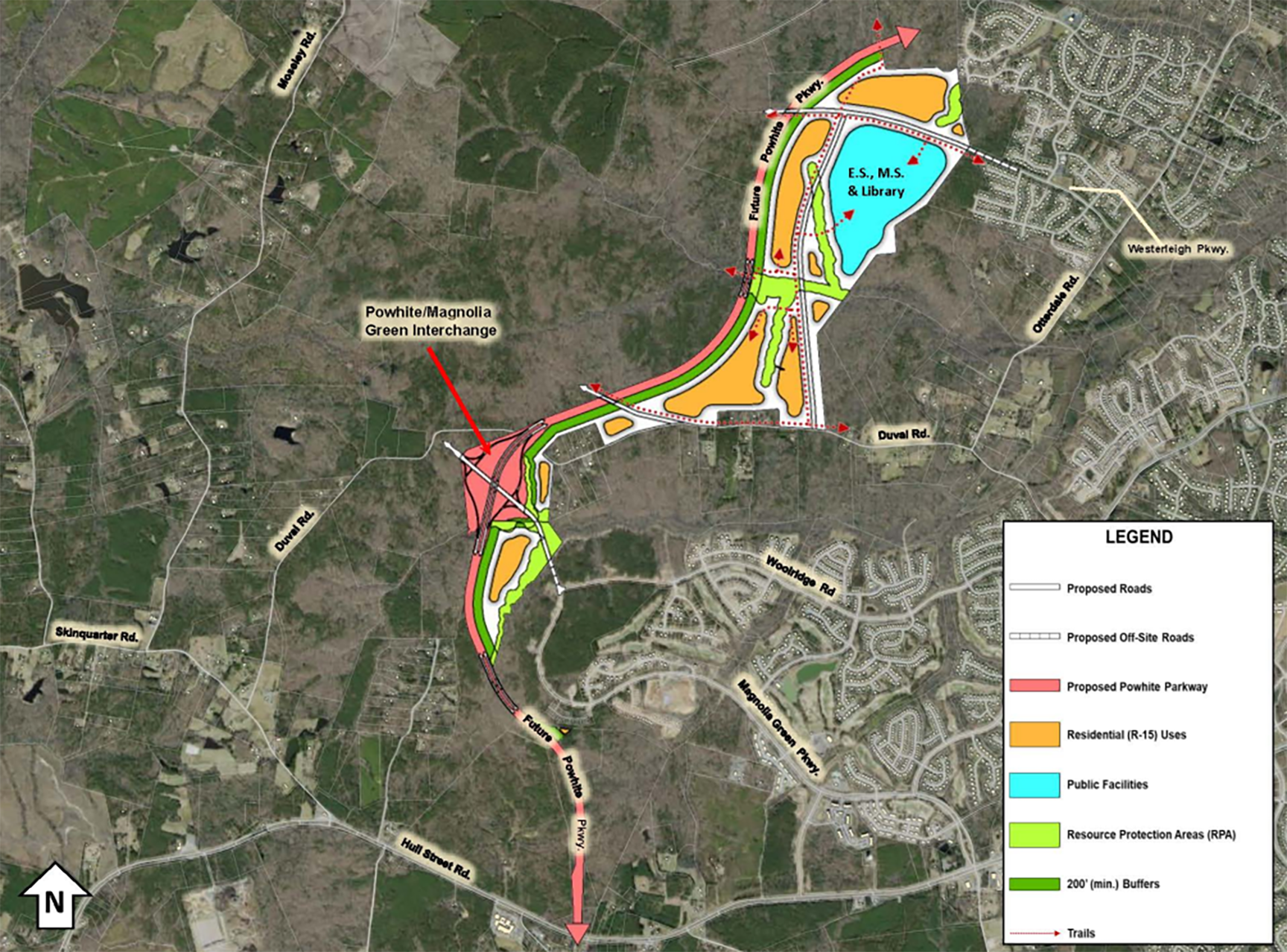
The Chesterfield Board of Supervisors approved the rezoning of 1,700 acres of the Upper Magnolia Green property to allow development of a technology park. (Images courtesy of Chesterfield County)
The stage is set for the development of 2,400 acres in western Chesterfield County with a new technology park and hundreds of homes.
The Chesterfield Board of Supervisors voted Thursday to approve a county-initiated rezoning request needed for a proposed technology park and public facilities on a 1,700-acre portion of the site in the so-called Upper Magnolia Green area near Moseley.
Supervisors also approved a separate rezoning application related to the development of up to 600 single-family lots and public facilities on the 700-acre eastern portion of the Upper Magnolia site. About 150 acres of the eastern area would be used for a middle school, library and potentially an elementary school.
The board split 3-2 in approving the rezoning for the tech park. They voted unanimously in favor of the residential portion.
Supervisors who voted in favor of the tech park piece cited the chance to use it for economic development and to help unlock state and federal funding for the extension of Powhite Parkway.
“I’m concerned about our water, I’m concerned about transportation,” Supervisor Jim Holland said, referring to concerns raised by residents about the project’s potential impacts. “The question really is, is this case in the best interest of Chesterfield County and the extension of the Powhite? I’ll have to say yes … I do believe this case will be transformative for Chesterfield for diversifying its tax base, its economy.”
The vote followed a failed attempt to defer the technology park case for further study and potentially additional county oversight over the rollout of the development, an idea that was supported by Supervisors Kevin Carroll and Jim Ingle, who ultimately voted against the technology park zoning.
“I think this case is not quite ready. I think there’s some guardrails we can put on it to hold future boards accountable,” Carroll said.
County officials envision the technology park as a new hub of advanced manufacturing, research and development and offices on a single campus in a fast-growing western area of the county north of Hull Street Road.
The park’s development is limited to seven principal uses: computer equipment manufacturing, office, laboratory, data center, electronic component and accessories manufacturing, pharmaceutical products manufacturing and research and development facilities.
Accessory uses include warehouses and plastic products manufacturing among several others.
The new general industrial (I-2) zoning for the western part of the property typically allows for more than 200 by-right or with-restriction uses. The county slashed the number of uses for the property to focus on select industries, according to a staff report.
Building heights in the park would be limited to 150 feet, which is 13 stories. About 100 acres of the western Upper Magnolia area would be set aside for a new high school and fire station.
The project site is bisected into its western and eastern portions by a future extension of Powhite Parkway that would connect it to Hull Street Road. County officials have said that the technology park would help secure funding for the project, which is estimated to cost around $700 million.
Prior to the approval of plans to develop facilities within the technology park, the county would be required to create a plan to build the extension of Powhite Parkway to Hull Street Road. That would include a funding plan that would have to be approved by the Board of Supervisors, according to the staff report.
The rezoning approvals Thursday capped off months of deliberation and public meetings related to the proposed development, which has drawn criticism from some county residents throughout the process. In a split vote, the Chesterfield Planning Commission voted to recommend approval of the two applications tied to the Upper Magnolia project in April.

Opponents of the Upper Magnolia Green technology park gathered outside the Board of Supervisors meeting room prior to its vote Thursday. (Jack Jacobs photo)
Opponents of the proposal continued to criticize the technology park during the public hearing that preceded Thursday’s vote. More than a dozen picketed outside the board meeting room prior to the vote.
Almost 40 people spoke during Thursday’s public hearing. Most of them opposed the project. Their concerns — some expressed in a poem by one speaker — focused on environmental impacts, what they called a lack of information about the project and other issues.
The proposal includes county-created buffers of 750 feet measured from existing homes on properties adjacent to the project area, in addition to 200-foot buffers along the proposed extension of Powhite Parkway, in a bid to address some concerns posed by residents.
Buffers will account for about 380 acres of the western area of the project site.
Some critics of the project also questioned how much of the technology park would be developable given the topography and wetlands in the project area.
Lawyer Andy Condlin of law firm Roth Jackson, who represented the county in the case, estimated more than 1,000 acres of the technology park would be potentially developable, though he said further engineering would be needed to confirm the final number.
In a public meeting last month, Planning Commissioner Gib Sloan estimated 500 to 550 acres would be “easily, readily available, developable land.” A VDOT traffic impact analysis dated May 6 is based on the assumption the technology park would be about 300 acres.
Assistant Planning Director Steve Donohoe, who was the case manager for both rezoning cases, declined to give an estimate on expected usable acreage when reached last week and said that additional engineering would determine the final developable area.
The technology park project had the support of ChamberRVA, which encouraged its members to support the development. The head of the Virginia Economic Development Partnership, Jason El Koubi, told supervisors in a presentation earlier this year that the technology park would be a boon to the county and region.
The majority of the 2,400-acre site is owned by the county’s economic development authority, which bought its portion of the assemblage in 2020.

The Chesterfield Board of Supervisors approved the rezoning of 1,700 acres of the Upper Magnolia Green property to allow development of a technology park. (Images courtesy of Chesterfield County)
The stage is set for the development of 2,400 acres in western Chesterfield County with a new technology park and hundreds of homes.
The Chesterfield Board of Supervisors voted Thursday to approve a county-initiated rezoning request needed for a proposed technology park and public facilities on a 1,700-acre portion of the site in the so-called Upper Magnolia Green area near Moseley.
Supervisors also approved a separate rezoning application related to the development of up to 600 single-family lots and public facilities on the 700-acre eastern portion of the Upper Magnolia site. About 150 acres of the eastern area would be used for a middle school, library and potentially an elementary school.
The board split 3-2 in approving the rezoning for the tech park. They voted unanimously in favor of the residential portion.
Supervisors who voted in favor of the tech park piece cited the chance to use it for economic development and to help unlock state and federal funding for the extension of Powhite Parkway.
“I’m concerned about our water, I’m concerned about transportation,” Supervisor Jim Holland said, referring to concerns raised by residents about the project’s potential impacts. “The question really is, is this case in the best interest of Chesterfield County and the extension of the Powhite? I’ll have to say yes … I do believe this case will be transformative for Chesterfield for diversifying its tax base, its economy.”
The vote followed a failed attempt to defer the technology park case for further study and potentially additional county oversight over the rollout of the development, an idea that was supported by Supervisors Kevin Carroll and Jim Ingle, who ultimately voted against the technology park zoning.
“I think this case is not quite ready. I think there’s some guardrails we can put on it to hold future boards accountable,” Carroll said.
County officials envision the technology park as a new hub of advanced manufacturing, research and development and offices on a single campus in a fast-growing western area of the county north of Hull Street Road.
The park’s development is limited to seven principal uses: computer equipment manufacturing, office, laboratory, data center, electronic component and accessories manufacturing, pharmaceutical products manufacturing and research and development facilities.
Accessory uses include warehouses and plastic products manufacturing among several others.
The new general industrial (I-2) zoning for the western part of the property typically allows for more than 200 by-right or with-restriction uses. The county slashed the number of uses for the property to focus on select industries, according to a staff report.
Building heights in the park would be limited to 150 feet, which is 13 stories. About 100 acres of the western Upper Magnolia area would be set aside for a new high school and fire station.
The project site is bisected into its western and eastern portions by a future extension of Powhite Parkway that would connect it to Hull Street Road. County officials have said that the technology park would help secure funding for the project, which is estimated to cost around $700 million.
Prior to the approval of plans to develop facilities within the technology park, the county would be required to create a plan to build the extension of Powhite Parkway to Hull Street Road. That would include a funding plan that would have to be approved by the Board of Supervisors, according to the staff report.
The rezoning approvals Thursday capped off months of deliberation and public meetings related to the proposed development, which has drawn criticism from some county residents throughout the process. In a split vote, the Chesterfield Planning Commission voted to recommend approval of the two applications tied to the Upper Magnolia project in April.

Opponents of the Upper Magnolia Green technology park gathered outside the Board of Supervisors meeting room prior to its vote Thursday. (Jack Jacobs photo)
Opponents of the proposal continued to criticize the technology park during the public hearing that preceded Thursday’s vote. More than a dozen picketed outside the board meeting room prior to the vote.
Almost 40 people spoke during Thursday’s public hearing. Most of them opposed the project. Their concerns — some expressed in a poem by one speaker — focused on environmental impacts, what they called a lack of information about the project and other issues.
The proposal includes county-created buffers of 750 feet measured from existing homes on properties adjacent to the project area, in addition to 200-foot buffers along the proposed extension of Powhite Parkway, in a bid to address some concerns posed by residents.
Buffers will account for about 380 acres of the western area of the project site.
Some critics of the project also questioned how much of the technology park would be developable given the topography and wetlands in the project area.
Lawyer Andy Condlin of law firm Roth Jackson, who represented the county in the case, estimated more than 1,000 acres of the technology park would be potentially developable, though he said further engineering would be needed to confirm the final number.
In a public meeting last month, Planning Commissioner Gib Sloan estimated 500 to 550 acres would be “easily, readily available, developable land.” A VDOT traffic impact analysis dated May 6 is based on the assumption the technology park would be about 300 acres.
Assistant Planning Director Steve Donohoe, who was the case manager for both rezoning cases, declined to give an estimate on expected usable acreage when reached last week and said that additional engineering would determine the final developable area.
The technology park project had the support of ChamberRVA, which encouraged its members to support the development. The head of the Virginia Economic Development Partnership, Jason El Koubi, told supervisors in a presentation earlier this year that the technology park would be a boon to the county and region.
The majority of the 2,400-acre site is owned by the county’s economic development authority, which bought its portion of the assemblage in 2020.




To me, this seems similar to Henrico’s Green City. Albeit there are some big differences, I think Chesterfield wants to take a bite out of this projected growth in the central Virginia region just like Henrico’s doing. I’m glad to see the addition of schools in the plan to support the huge residential area. I think the extension of the Powhite and growth in this area was inevitable. Anyone that’s driven down Hull St recognizes the crazy growth the area has experienced in the last 20 years. Chesterfield would be dumb not to attempt to get ahead of the growth.
The Powhite extension is waaaaaay overdue and desperately needed. It’s very difficult to navigate the Hull Street Road corridor west of Route 288 because of the extremely heavy traffic in both directions, and the Powhite extension should provide some much needed relief.
This plan is needed given the growth of the county. However the notion that an extended powhite parkway will help alleviate traffic is short sighted. The only thing more roads do is create more traffic. We need a true commitment to mass transit from Chesterfield County, along with dense housing corridors.
I hope they are planning for Powhite to extend even further at some point. Otherwise they are setting themselves up for a future problem beyond the new termination out that won’t even have a solution. But just like how they messed up the original 288 alignment I do not have any confidence they have thought that far ahead.
Poet’s opinions aside, it’s crazy that there is more support for single family homes than for a tech park — one of Chesterfield’s biggest problems is too many people wanting to live there but not enough big tax generators to support it — more houses means higher taxes if it is not balanced by things like manufacturing, while Retail tends to be more neutral.
Is this like the Meadowville Technology Park that has was all the rage back in the late 2000s but now is a Amazon Fulfillment Center, a medical supply logistics warehouse, a water bottling plant, small VITA offices, and a data storage back up center. Not the heavy tech (Microsoft, Google) campuses that the site were supposed to become. Powhite extension will just help move the back up from 288 and Hull to 76 and Hull.
Still VERY successful though from a jobs and revenue POV —- look, Richmond is not, oh… Boston — it’s not even Pittsburgh and and Southside is esp not.
Meadowville has only been a “failure” if you wanted to keep traffic in that area down — but, really it was about the best place to build it — lots of connectivity and minimal driving on small streets.
Drive down Route 1, 60 or 360 to name a few – There are SEVERAL blighted areas that need to be torn down in the county on existing roads and intersections. Developers come in with a plan and the new businesses coming to town to create jobs and everyone is happy. Existing infrastructure is already in place, too. Now, push through a plan quickly to make the same families rich; tear down the trees (horrible) and then extend a road to create more bottlenecks thus destroying a source of drinking water. Add increased taxes that are already sky high. Not… Read more »
If what you are saying is that we should redevelop places like Rt One more, I agree with you.
Get ready wildlife, Run for your lives.